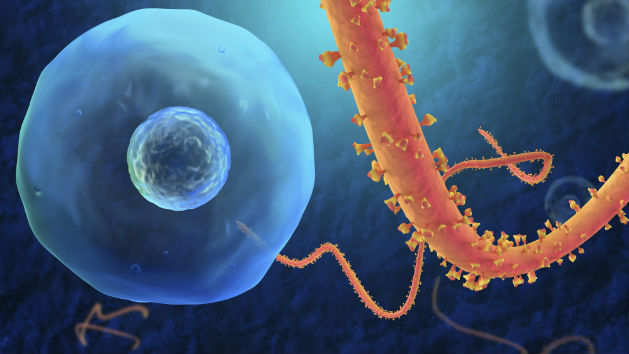Answers to the Ebola Questions You Were Too Embarrassed to Ask
Published at
 iStock/Thinkstock(NEW YORK) — News that two nurses contracted Ebola in the United States has Americans on edge, but here are a few Ebola facts to calm your nerves.
iStock/Thinkstock(NEW YORK) — News that two nurses contracted Ebola in the United States has Americans on edge, but here are a few Ebola facts to calm your nerves.
“There are fundamental things we do know about Ebola and it’s those things that can make most people in America rest very well at night that they don’t have a risk of contracting this disease,” said ABC News chief health and medical editor Dr. Richard Besser during ABC News’ Ebola town hall event on Friday.
When Does Ebola Become Contagious?
Ebola is contagious when someone is symptomatic, Besser said. A fever is the first symptom of Ebola, which means the virus is beginning to multiply in the patient’s blood when a fever sets in.
As an Ebola patient gets sicker and sicker, the amount of virus in his or her blood multiplies, making them even more contagious.
How Is Ebola Spread?
Ebola is spread through close contact with an infected person, and it’s not airborne, Besser said.
“We also know from the studies in Africa that it’s a hard disease to get,” Besser said. “If this disease was spread through the air or was spread easily — that you could get it from someone you’re standing next to in the market or sitting next to on a plane — this outbreak would be far larger than it is today.”
People who contract Ebola usually do so because they’ve cared for someone who was infected in a hospital setting or at home, Besser noted, or they’ve touched the body of a person who died of Ebola.
Can It Become Airborne?
“The majority of scientists say that while it’s possible, it’s highly unlikely,” Besser said, explaining that the virus would have to mutate significantly.
What If Someone With Ebola Sneezes on Me?
Sneezing is not a symptom of Ebola, Besser said. Neither is coughing until the very late stages of the disease, when the person is clearly sick and near death. On top of that, the disease is not airborne.
Can I Get Ebola From Someone’s Sweat?
There’s very little data on how much of the virus is in a sick person’s sweat, Besser said.
He added that carrying a person who is sick with Ebola can be a “risky situation.” He said one man who had Ebola on a plane didn’t spread it to fellow passengers but inadvertently gave it to the people who helped carry him once he got off the plane.
“Touching the skin — whether he had other body fluids or sweat on his skin at that point — was a risk,” Besser said.
What If I Stand Next to Someone With Ebola on a Subway?
You probably won’t catch it in that situation, said Dr. Jay Varma, New York City’s deputy commissioner for disease control.
“Casual contact like you would have somebody pass you on the bus or on the subway, I’m not worried about it for myself and I’m not worried about it for my wife and kids,” Varma said.
How Long Can the Virus Survive on Surfaces Like Tabletops and Doorknobs?
“This is one of these areas where we don’t really know enough,” Varma said. “We do know that these viruses can survive on surfaces for a few hours.”
He said how long it can survive depends on the surface and the environment.
Should You Take Precautions Before Taking Public Transportation?
“We think this is not a disease that you can get from simply being next to somebody,” Varma said. “Absolutely if somebody vomits on you or you get their body fluids on it, of course you can be at risk, but we think that airplane travel, traveling on subways — all of that — is the type of contact where this is not a disease that’s transmitted.”
He said he’s more worried about getting the flu on public transportation than Ebola.
Is There a Vaccine Coming?
There are two vaccines being tested in clinical trials now, Besser said.
“There’s a lot of efforts underway to try and move a vaccine forward but vaccine development takes a long time,” he said, adding that one of the companies working on one has said it won’t know whether it works until 2015.
Even if it does work, it will take more time to manufacture.
What About Other Drugs?
Ebola patients in the United States are receiving experimental drugs, but it’s not yet clear whether they’ve helped, hurt or made no difference in those patients’ outcomes, Besser said.
Why Don’t We Just Close Our Borders to West Africa?
Keeping people from leaving the Ebola-affected countries would be a “major mistake,” Besser said, noting that he saw aid workers, journalists and family members aboard his plane on his two trips to Liberia in the last few months, and that letting them in and out is important.
“You want to make sure that people who leave that area are being monitored and doing it safely,” he said. “You want to encourage people to go there who have expertise and can help these governments, these health workers, control this disease. That will save lives there and will also improve the health and protection of Americans right here.”
Varma said the biggest concern in America should be containing the outbreak in Africa. Until that happens, he said “we will always be at risk.”
“You can’t just wrap a wall around these countries and not expect people to get out,” he said.
Follow @ABCNewsRadio
Copyright 2014 ABC News Radio


